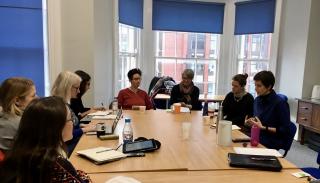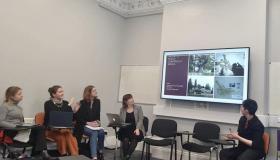Workshop report: Critical Mappings and Future Directions of South East Europe and the International
The working group met to discuss Critical Mappings and Future Directions of South East Europe and the International at the Queen’s University Belfast. Supported by BISA SEE Working Group and the Centre for Gender in Politics at Queen’s, the workshop was a platform to share research and identify key trends and needs in studying how international politics are made in, as well as make, South East Europe.

While the current circumstances make it difficult to plan new meetings, it is also a good time to reflect on the collaboration that has happened in the past and that continues online for the moment, and in person soon. In this spirit, we present a short report from the last event organised by the South East Europe Working Group. The working group met at the Queen’s University Belfast to discuss Critical Mappings and Future Directions of South East Europe and the International. Supported by BISA SEE Working Group and the Centre for Gender in Politics at Queen’s, the workshop was a platform to share research and identify key trends and needs in studying how international politics are made in, as well as make, South East Europe.
We use this short post to explore some of the main themes that emerged in the workshop. These themes are indicative of some of the most pressing issues in the region, as well as its role and place in international politics. You can also read the full program and information on the speakers.
Changing circumstances and contexts
Many speakers reflected on the changing nature of politics in the region that demand attention given to different topics and require changing frameworks for comprehending them. The growth of populism in Turkey is one such phenomenon. Çağlar Ezikoğlu pointed out that the rise of AKP in Turkey is substantially different from populism in Western Europe: as such, it is not only incomprehensible through frameworks developed for studying other cases but can also contribute to our understandings of varieties of populism globally. Natalie Martin similarly referred to the increasing securitisation of the media space—the focus of her own research, as a particularly salient dimension of the democratic backsliding in the Turkish case.
Another development in SEE has been the growing pessimism felt in all of the polities in the region. Jessie Barton Hronešová pointed out that her fieldwork in the late 2000s called upon a sense of optimism and possibility among people in Bosnia and Herzegovina (BiH), while today they turn to undeniable limits of change and pessimism. It is crucial for researchers to ask how their work both reflects and affects these changing circumstances. As a possible strategy, Daniela Lai spoke about the importance of posing questions that are not only relevant to International Relations, but also reflect the concerns of people involved in these politics. Drawing on this approach, divisions between the production and use of knowledge can be challenged.
New frameworks
All participants reflected on the need for and proliferation of new frameworks in approaching the region. After 30 years of international interventions of various kinds, the region has largely moved away from the media spotlight. Where international media attention has been stubbornly present, for example in the context of wartime sexual violence in BiH, activists and scholars have noted that visibility has failed to translate into long-term support for those most affected (see here for a discussion of these issues). Taking a critical approach to the in/visibility of the region, scholarship on the long-term consequences of conflict and post-conflict reconstruction is increasingly nuanced, reflecting the temporal and topical complexities of local and regional dynamics.
Multiple participants reflected on processes of post-conflict justice seeking. Daniela Lai, for example, investigated the intersections of justice claims and political economy in Bosnia and Herzegovina that shed light on the socio-economic aspects of the 1990s conflicts, as well as post-conflict and post-socialist developments. Lydia Cole and Jessie Barton Hronešová both reflected on the need to understand post-conflict justice seeking in terms of differentiated frames of recognition that govern the possibilities and identifications of victimhood—especially when it comes to gendered experiences of war and conflict. Furthermore, Maria-Adriana Deiana spoke about the importance of drawing on critical feminist lenses to unpack grassroots politics and international frameworks. Bringing the concept of the everyday to the fore, she shed further light on the gendered international politics of the region. Discussions at the intersection of gender and victimhood resonated across contexts. Questions from members of the audience and the panel’s facilitator, Sarah Jankowitz—whose work focuses on victimhood and processes of dealing with the legacy of the past in Northern Ireland—prompted further reflection on the gendered, legal, social, and political dynamics of victimhood.
Another emerging area of research was art and politics. Art was explored as a practice in Lydia Cole’s stitched fieldnotes, but also as an object of analysis: Maria-Adriana Deiana, for example, looked at film festivals in her articleon border politics of Sarajevo Film Festival, while Catherine Baker spoke about the use of audio and visual material to tease apart narratives of race and coloniality that form the foundation of her book Race and the Yugoslav Region. Moreover, within research on peace and conflict, scholarship is increasingly recognising the multitude of spaces where art is involved in the production of community, actively transforming polity itself—as Lydia Cole’s study of Vraca Memorial Park in Sarajevo shows.
And, perhaps unsurprisingly a lot of attention was paid to everyday practices and experiences: a starting point for understanding the complexities of WPS institutionalisation (Maria-Adriana Deiana); a methodological reorientation to choosing questions that ‘matter’ to our interlocutors in the region (Daniela Lai); a springboard for provincialising IR from the Balkans (Katarina Kušić), or the different everyday-s that we encounter within particular institutions and among people not involved in institutional politics (Catherine Baker).
Where from here?
The participants acknowledged the now overwhelming critique of area studies’ place in Cold War geopolitics — an issue that Francine Rossone de Paula, in chairing one of the sessions, highlighted as a theme that connects SEE and the Global South. Within SEE, as much as in the Global South, this issue is exacerbated by the pervasive Balkanisation and Orientalisation of the region in both popular and scholarly accounts. The participants thus reflected on the role of a geographically-defined working group within BISA: What are the advantages of a regional approach to international politics and where are its limits?
Despite the problematic legacies of the ‘area studies’ label, participants agreed that it was still a space with much to offer. To the extent that the group’s topics, frameworks, concepts, and problems are interdisciplinary and problem-driven, it helps to broaden our field of visibility beyond the remit of International Relations. While a turn toward the region could be perceived as a retreat to isolationism, the participants of ‘South East Europe and the International’ demonstrated how this focus opens up a range of critical avenues, which were, importantly, attuned to the pressing questions arising from the everyday of international politics. Moreover, such approaches that take the local and the international together help problematise the international/domestic division that haunts International Relations. Katarina Kušić pointed to her own work that uses the experience of those living in spaces of intervention to challenge the concept of intervention itself. This is a part of a larger project to use SEE as a space of theorisation and knowledge production capable of decentring IR.
The meeting in Belfast also marked the start of new convener team: Çağlar Ezikoğlu (Çankırı Karatekin University), Lydia Cole (University of Durham), and Katarina Kušić (Aberystwyth University). The new conveners look forward to continuing these conversations at future WG events. To keep up-to-date with events and news from the working group, please join our mailing list by contacting seewg.group@bisa.ac.uk.
